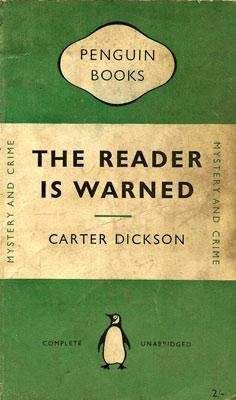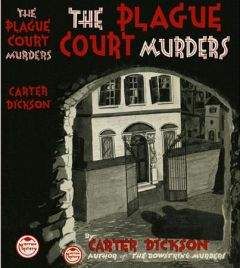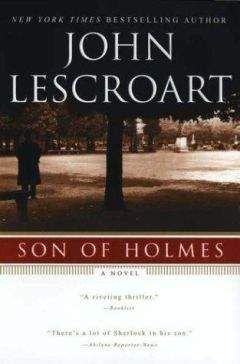John Carr - The Reader Is Warned
На электронном книжном портале my-library.info можно читать бесплатно книги онлайн без регистрации, в том числе John Carr - The Reader Is Warned. Жанр: Прочее издательство неизвестно, год 2004. В онлайн доступе вы получите полную версию книги с кратким содержанием для ознакомления, сможете читать аннотацию к книге (предисловие), увидеть рецензии тех, кто произведение уже прочитал и их экспертное мнение о прочитанном.
Кроме того, в библиотеке онлайн my-library.info вы найдете много новинок, которые заслуживают вашего внимания.

John Carr - The Reader Is Warned краткое содержание
The Reader Is Warned читать онлайн бесплатно
Masters looked even more worried.
'Hold on, sir! Does that mean you think he will do it?'
'If he can,' repeated H. M. stubbornly. 'No, I don't go that far. I'll give you consolation. In point o' fact, I think Sanders is pretty safe -'
'Yes, sir, that may be all very well,' the chief inspector objected. 'But that's what you said about Mrs Constable too; and she's as dead as King Tut now.'
'You're a fine pair of Job's comforters, aren't you?' interposed Sanders, not without reason. 'A couple of damned old ghouls, if you will excuse the plain speaking. Would you like to order my shroud now, or can it wait until we get back to town?'
H. M. was soothing.
'Now, son, you're all right. You'll be quite all right if you-'
'I know. If I just trust the old man. Very well; consider the trust applied.' He brooded.
'All the same, up to now I always believed I lived in an ordered, ordinary world where nothing much ever happened. I rather envied Mar - that is, I envied people who could travel on voyages to Japan. In actual fact, nothing much has changed. I still eat and sleep as usual. All the wallpaper looks the same, and I don't get any more money. But I feel I've stepped over into a new kind of world where anything can happen.'
'That's what we shall all be feeling,' the chief inspector decided gloomily, 'if all this flummery about Teleforce is allowed to go on. Teleforce! Did you hear 'em back at the railway station? And that woman sticking her head out of the train window? And at the book-stall. I wish we'd had time to get an evening paper, though. We might see if we can get one when the train stops next.'
Obediently the train did stop, with a sudden flight and an equally sudden pull-up like a ballet dancer. Masters disappeared into the streaming dimness and returned with an armful of newspapers.
'H'm,' said H. M.
There was a brief, rustling pause after the train had pulled out again. 'This,' said H. M., 'is pilin' Babel on top of Pisa. The scientific swells have now weighed into the controversy. "Professor Huxdane, interviewed, consented to say one word: 'Balderdash.' (That'll make Pennik foam.) Professor Trippletts, on the other hand, while admittin' the theoretical possibility of such a weapon, says that the idea is not new. (That'll make him foam still more.) Yes, good enough.' H. M. glowered at Sanders. 'If only you hadn't butted in! If only you had kept quiet in front of Pennik!'
Dr Sanders sat back.
'One question,' he said. 'Will you tell me why I am the villain of the piece? Why pitch into me? I've offered to call Pennik's bluff for you in the only possible way. Instead of giving me at least a word of thanks, you're going on as though I had spoiled some scheme of yours.'
'You have, son.'
'How?'
"That's the blinkin' awful cussedness of it,' said H. M. wearily. 'I was being crafty; I had everything all planned out. I was goin' to snaffle Pennik just like that.' He snapped his fingers. 'At least, I had a forty-sixty chance to do it, which is the most you can hope for in this world. Now you've reduced it to ten-ninety. Oh, my eye. That's why we're goin' down to Fourways in such a rush. I've got two more chances -'
'To get Pennik?' demanded Masters.
'That's right.'
'To get him when ?'
'To-morrow, if we're lucky.'
Masters eyed him. 'Well, you'd better not be too long about it, sir. Mind, I don't for a minute believe a word of all this rubbish. All the same, what if Pennik decides to polish off the doctor here before then?'
'No,' said H. M., shaking his head quite seriously. 'There's twenty-four hours' grace there. Pennik won't move until he makes his speech at Paris to-morrow night -'
'Ha, ha, ha,' said Sanders.
'Be quiet, will you?' ordered H. M. with austerity. 'You're not in this. And, as I was sayin', Masters, until he gets ready to bust his bombshell on the floor then. We're all right for the moment.'
'I hope you know what you're doing, sir. But I tell you straight. I'm beginning to think you're clean daft. You don't mean you're going to let him make that speech ? You can't mean that. I can think of half a dozen ways to stop him; easy ways, eh?'
'Tut, tut. Why stop him?'
Masters grew very quiet.
"Then there's another thing,' the chief inspector went on, his eye and brow darkening with suspicion. He held up a newspaper. 'Have you seen this? The Evening Planet?'
H. M. said, rather guiltily, that he hadn't. He asked what was in it.
'I'll tell you what's in it,' replied Masters. 'There are two pictures of me in it. "Chief Inspector Masters as Himself." Then, "Chief Inspector Masters Disguised as an East End Tough." The picture of me as myself looks about fifty times tougher than the one of me disguised as an East End tough.
But never mind that. I've been (as you would say) sitting and thinking, and blowed if I can remember more than one person who had a copy of that picture of me disguised. Did you give it to this paper?'
'Now, now.'
‘Did you?'
‘Just keep your shirt on, Masters.'
‘I'll try to. I've had a bit of an idea, too, that it was you who wrote that full-column letter in the Daily Wireless, Now I don't say you're as mad as a March hare, sir; I don't say it. But when they stick you in the House of Lords I only hope I'm in the gallery to see, that's all. And what are we doing now, going down to Surrey? What do you expect to find there?'
H. M. was stubborn.
‘For one thing,' he insisted, 'I got to find that press-cutting scrap-book of Mrs Constable's.'
‘Oh, ah ? That? In spite of all I tell you, you still think it's in the house?' ' 'Yes.'
‘And where do you think of looking for it?' 'That's just it. I dunno.'
Masters gave him up. The blurred windows of the compartment whitened with lightning, and thunder descended like falling masonry to mingle with the rattle and click of the wheels. None of them spoke until the train drew in at Camberdene, where Superintendent Belcher, in response to Masters's telegram, was waiting for them with a car.
And none of them, perhaps, liked driving through the open country in a thunderstorm. Fourways looked as black as the rain when they drew up before it, and the grounds had turned to a swamp. It was more than ever a gutted house, a hollow house, a dead house. Superintendent Belcher had a key to the front door; inside, the rain on the roof sounded like a heavy hammering.
'Now that we're here -?' suggested Masters, when they had turned on a blaze of lights.
H. M. peered round the front hall.
'Don't hurry me. Lemme think. Ah, I got itl When you looked for that scrap-book, what about the conservatory? Did you give the conservatory a good going over ?'
'You can bet we did. If you're thinking the book may have been hidden under one of the plants, that's out too. We didn't uproot 'em all, naturally; but the soil in those boxes and pots was so dry that we'd have noticed any disturbance.'
'All the same, let's have a look.'
Drawing-room, dining-room, conservatory. All as Sanders remembered them on the night Mina Constable died. On the dining-room table, under the glowing mosaic dome, the fragments of broken glass still lay in a sticky dried puddle where Sanders had dropped the tumbler when he thought he saw Pennik looking at him.
They re-created the past like a scent or a sound.
Pennik couldn't do anything. Pennik was a burst bogey. Pennik had been told off to his face. All the same -
H. M. had opened the glass door to the conservatory, and was bending close to blink at it.
'If you're looking for finger-prints,' observed Masters with a sour grin, 'you can save your eyesight for brick walls. There aren't any. Yes, I know the doctor said Pennik shoved his nose and his fingers against that glass; we didn't neglect that. But either they were wiped off afterwards or else they never were there.'
Sanders refused to be drawn. . 'So now I'm accused of seeing things?'
'Don't forget the astral projection,' growled H. M., wagging the door back and forth. 'I say, son. Did you see anything of Pennik except his hand and face?'
'Not clearly, no.'
'Did you hear him when he ran away?'
'No, I can't say I did. But I'll swear he was there; there was no jiggery-pokery about that.'
Pennik couldn't do anything. Yet his image, huge and ugly and dead-looking, seemed to gather and spread through Fourways.
It was Masters who pushed past H. M. and found the switch in the conservatory. The clusters of luminous fruit bloomed again under corners of the glass roof; and the din of rain beating on that glass dome was so deafening that they had to raise their voices in order to make each other hear. But it was a relief not to see Pennik sitting in a wicker chair among the semi-tropical plants. H. M. wandered to the dry fountain in the middle of the maze.
'Hoy!' he bellowed.
'What?'
‘A very important question, son. When you saw Pennik through that door on Sunday night, and ran out here, was this little fountain working?'
‘No.'
'You're sure of that, now?' insisted H. M., poking out one finger.
'I'd swear to it. I remember how dead quiet the place was. What's more, I remember passing the fountain. But why?'
'Only,' said H. M. mildly, 'this. If that's so, it's one of the most important pieces of evidence in the case.'
Masters was at his side in a hurry. 'Steady a bit! An important piece of evidence? You think that's important with regard to whether Pennik was or wasn't here? Or has anything to do with explaining his being here? But what about the fountain ? It's an ordinary Gamage garden fountain; pumps up the same couple of gallons of water and uses 'em over and over again. I had a look at it, because I was thinking of buying one once myself.'
'Whether you were thinkin' of buyin' one or not, Masters, it's still important. And I don't care how it works! That's not the point. Now let's see.' He sniffed round the overgilded, over-decorated lounge. 'Any more doors here? Ah! One. Goes to the kitchen, does it? I thought so. But there don't appear to be any back stairs. Make note of that: no back stairs.'
H. M. was peering into the- kitchen. Again Masters followed him.
‘But-’
'On the other hand,' persisted H. M., muttering rapidly to himself and making fussed gestures to keep Masters away, 'our late friend Sam Constable's bedroom is directly over the dining-room back there. I seem to remember Mrs Constable tellin' me that. Yes. Also, I seem to remember seeing a balcony outside one of his bedroom windows, with stone stairs leadin' down to the ground. (If you don't get away, Masters, I'll murder you.) So you could go from the dining-room to that bedroom upstairs without being seen; and come down again too. If we -'
'God!' said the chief inspector involuntarily.
It was not the glare of lightning through the glass roof which made them all jump, though it turned the whole conservatory to a blaze of deathly daylight and put the same pallor on their faces. It was, instead, the enormous crash of thunder which began in a long splitting noise as though the glass roof were crumpling, and then exploded close over their heads to the end of the peal. The dome vibrated to it; one of the small panes in the roof did, in fact, fall and smash on the tiles; and the rain poured through. But all sights or sounds were entangled with each other and happened at once. They saw each other's faces in such pallor because, in the instant of the lightning-flash, every light in the house went out.
'That's torn it,' said H. M.'s voice out of the dark.
Superintendent Belcher's voice spoke cheerfully. 'It's all right. I've got an electric lantern here. What was it, do you think? Wires down outside, or a fuse blown?'
Masters was not so easy. The shock of that assault still made the room tremble, and the darkness was dense. He spoke loudly above the rain.
'Wires down outside, I should think. They've got so many extra fittings that they're on distributing fuses, one to two or three rooms; and you wouldn't blow out the whole lot at one go unless -'
'Fuse-box,' said H. M. suddenly.
‘What's that, sir?'
'I said fuse-box. Masters, when you went over this house so thoroughly, did you look inside the fuse-box?'
'No; why should I? I'll swear it wasn't touched before or after Mrs Constable's death -'
'I wasn't thinkin' about it in connexion with anybody's death. I was thinking about it,' answered H. M.'s voice in the dark, 'as the one perfect hiding-place for a flat book eighteen inches high by ten inches broad.'
After a pause he added:
'Where is the box?'
'As a matter of fact, it's at the back of the cupboard in Mrs Constable's bedroom,' said Masters. 'And we're going up there now.'
The beam of the superintendent's lantern went ahead of them. In the forlorn bedroom upstairs, and in the side of the room furthest from the bed, was a large wardrobe cupboard with folding doors. Just above the shelf inside was the black-painted iron cover of the box, held upright by two light screws: a large box, some two feet high by a foot and half broad. Standing on a chair, Masters carefully undid the screws. As the cover fell, a tall thin book in colours of black and gilt flopped out into bis face, and dropped with a thud into the cover again.
'So that's it,' snarled Masters.
'That's it, son. Serene and untouched where Mina Constable shoved it away as long ago as the night her husband died. Also, the perfect hidin'-place. You look at a fuse-box; and it never enters your head that there could be anything inside it except fuses; it's all too snug and close. But the cover don't fit in close against the contents: it can't. And if you want a place to hide your money where no burglar will look for it, take a tip from Mina Constable. It was one of her -more ingenious ideas.'
Masters jumped down from the chair.
'Ingenious ideas, eh?' he said, and shook the book in the air. 'Just so. Got the bounder, anyway!' He shook it more savagely. 'You think this is what we want?'
'Yes. Maybe. If it contains what I hope it does - Masters, we've got Pennik. Put it down on the table and let's have a dekko at it.'
The light was held for them. While the rain splashed the windows, Masters put New Ways of Committing Murder on the dressing-table, and the others bent over his shoulder when he opened the book.
It was a grisly exhibit, in its way. It contained, neatly pasted in, a long series of press-cuttings all dealing with violent death in one form or another. They seemed to have been collected over a period of seven or eight years. Some were so old as to have had the paper turn dingy; others were frayed or ragged as though they had lain long in a drawer before their owner decided to make the collection; still others looked fresh. Though in a few cases the date and the name of the paper had been written above the article, as a rule they bore a question-mark or were left blank. Some were from popular magazines; one or two from a medical journal. Not even any chronology in dates had been kept; 1937 came before 1935, and 1932 turned up between both. Over everything you could see the clever, untidy mind of Mina Constable.
Похожие книги на "The Reader Is Warned", John Carr
John Carr читать все книги автора по порядку
John Carr - все книги автора в одном месте читать по порядку полные версии на сайте онлайн библиотеки My-Library.Info.


